Bali is a dreamland.
You have so much at your fingertips: surfing, yoga retreats, luxury villas in rice paddies, luxury villas on the beach, infinity pools, unique Hindu temples, vibrant local culture, hiking (if you know where to find it), amazing food, a great indie cafe and restaurant scene. And when you’re tired of it all, there are sunny beaches to simply veg out on.
That said… every rose has its thorns.
The traffic is overwhelming, it’s easy to overdo it on the partying, not everybody is as nice as you’d like, and as a “bonus” there are volcanoes and earthquakes, too. Should you be worried about those?
That is why I’ve created this EXHAUSTIVE safety guide for Bali. We’ve packed it to the brim with all the tips and information you need to make travelling to Bali a breeze.
I’ve use my own experience from living a year on this magical island and I’ve asked friends (especially in other areas) what safety tips they’d give visitors. We think we pretty much got it all, but if we didn’t let us know your thoughts in the comments below.

How Safe is Bali? (Our take)
Bali is definitely a safe place to travel. I wouldn’t be sitting in a Canggu Coworking spot writing this if I thought otherwise!
It may have caught the headlines in the past for some scary reasons, but nowadays Bali is mostly the veritable paradise we expect.
Bali has won numerous awards for being a top tourist destination…
- Travel + Leisure includes it in its “Best Islands” award list almost every year.
- BBC Travel dubbed it “one of the world’s best islands” (2nd place, after Santorini)
The tourist and expat numbers certainly reflect these commendations; a lot of people from around the world make their way to Bali.
In 2017, 5.7 million tourists arrived on the island, according to Bali’s regional government. Just two years earlier (2015) it welcomed 4 million foreign visitors: with a population of 4.2 million, that’s as many visitors per year as residents!
Tourism to Indonesia as a whole doesn’t seem to be slowing down any time soon. In fact, Indonesia’s Ministry of Tourism is aiming for a target of 20 million visitors for 2020. With these lofty goals in mind, regional and national governments are doing lots on the island to attract more travellers and vacationers.
Is Bali Safe to Visit? (The facts.)
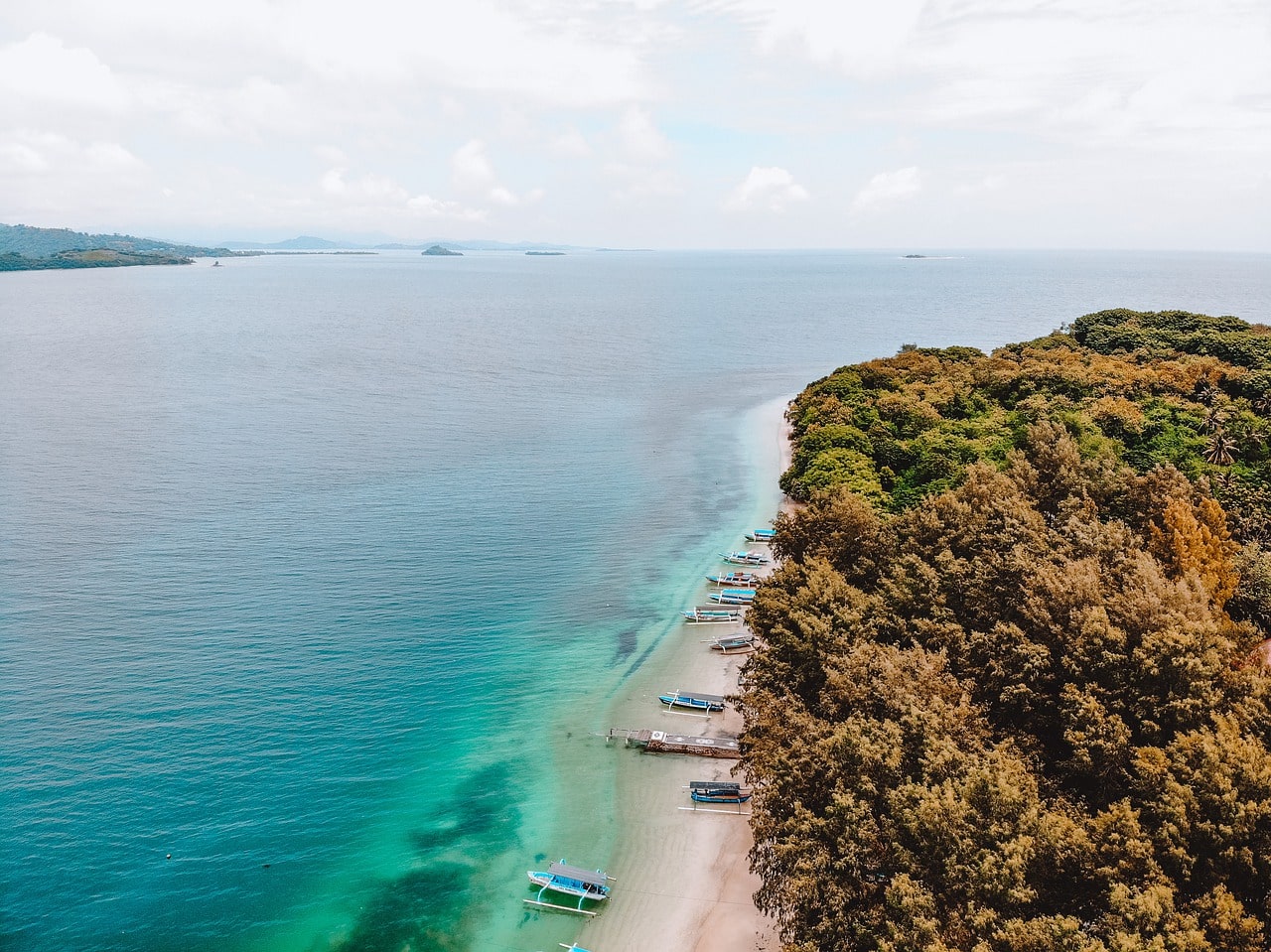
Pickpocketing, bag snatching and overzealous tourists can be more than just a hindrance to your fun. Then there is the volcanic activity from Mount Agung, as well as plastic pollution that can choke some beaches and bodies of water.
Mosquitos carry diseases and stray dogs can be aggressive. Cab drivers might rip you off if you use them but if you opt for Grab or GoJek in the wrong area, you might witness a knife fight between the cabbies and ride-sharers.
Driving here is dangerous normally but for good measure, throw in drunk drivers, novice drivers, rode-ragey teenage drivers, narrow roads, uneven roads, wet roads and roads that literally slip into the rice paddy if you take them wrong.
Trash is a big issue. In 2017, in response to 3.6 miles of coastline being covered in plastic, the island declared a “garbage emergency”. In fact, Indonesia is the source of 10% of the world’s plastic waste. It really is an emergency.
Looking at crime figures, in 2016 there were a total of 3,347 criminal cases in Bali, very few of which were violent in nature. For tourists, petty theft is the main worry, with most incidents of this occurring in and around Denpasar. But why would you be in Denpasar? Likely, you won’t see the big city at all.
None of this is to deter you from visiting Bali! Below might be the biggest guide to avoiding any hazards and having the best freaking holiday in Bali you can imagine!
Is it Safe to Visit Bali Right Now?
There’s nothing to keep you from visiting Bali right now, but here are some things the media (and maybe you) are concerned about:
Indonesia’s Purity Laws
Back in September of 2019, all eyes in the region were on Joko Widodo, president of Indonesia, who nearly pushed through a new criminal code that could have torn apart free speech and human rights in the nation. One such change would be to outlaw extramarital sex. The country’s citizens would have had it worse – facing severe punishments for criticizing the government.
These laws did not pass and cannot be used to prosecute neither foreigners or locals. It’s possible that a revised criminal code will be presented at some point.
Volcanic Activity
Mount Agung erupted on June 28, 2018, emitting gas and ash, which closed down airports and effectively put the country on lockdown. To this day, there is a 4 kilometre exclusion zone around the crater of Mount Agung (on the east of the island).
Volcanoes can erupt without warning; and ash clouds can affect breathing conditions, not just flights. Even so, don’t plan your visit around the remote possibility of a volcanic eruption. If one happens, listen to locals and to the news to find out what to do during and after the disaster.
Bali Travel Insurance
Get travel insurance!
This post is basically a 5,000+ word manifesto that almost anything can go wrong during your visit to Bali! I’ve had friends in surfing accidents and scooter crashes, who have gotten helmets, phones and whole bags stolen, and who have contracted typhoid and dengue!
For my friends who had travel insurance, their trip was basically uninterrupted. For others, their vacation became a fiasco of trying to navigate the Balinese medical system on their own or waiting for hours to get some police attention for the theft (but that’s just not how it works here).
The unthinkable can and does happen so it is better to be insured.
I use World Nomads to insure my adventures and they’ve proven to me and my friends that they don’t play the but-is-this-claim-for-real game. If you have an insurance plan with them, you can be sure they’ll respect it as long as your claim falls under the terms and conditions for that plan. Please do read the terms and conditions to make sure they are the right provider for your trip. Boring, yes, but crucial.
17 Top Safety Tips for Traveling to Bali
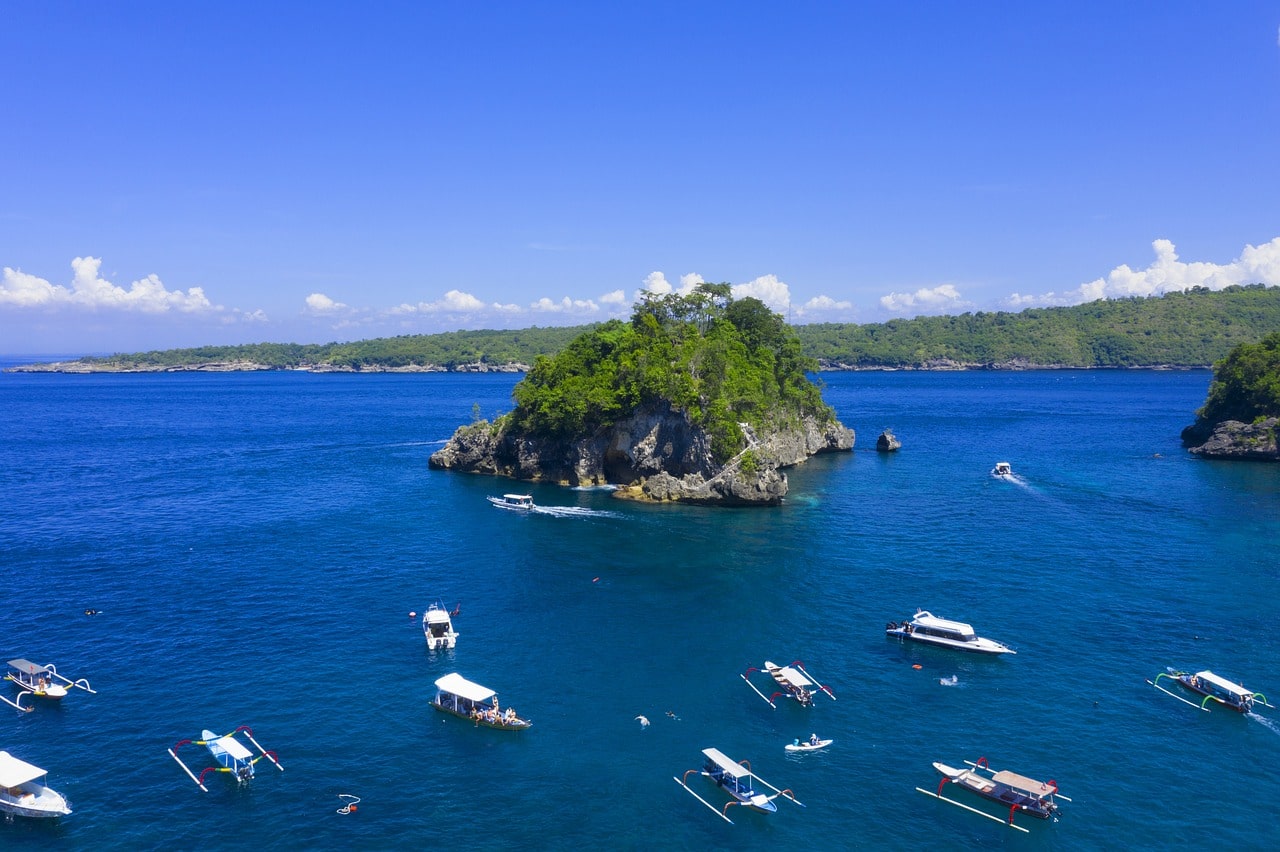
Okay, you still with me? I’ve gleaned loads of general Bali safety tips from my experience and from the tales of woe from locals and fellow travelers. Read those here and read specific tips for female travelers, solo travelers and families further down.
- Protect your belongings. Pickpocketing and bag snatching happen, especially in busy areas in Seminyak and Kuta. Don’t leave things on your bike – if you have a nice helmet, take it with you.
- Contact the tourist police if something happens to you or your belongings. Will they get it back for you? Uh, unlikely. Do you need a police report to make a theft claim on your travel insurance? Usually.
- Know which taxis to use. BlueBird is the official taxi service of Bali (you’ll see the blue cabs). GoJek and Grab are significantly cheaper. But you cannot use GoJek and Grab in most popular areas of Kuta, Seminyak and Canggu. Sometimes your GoJek will refuse to come get you. Sometimes the GoJek will arrive wide-eyed and spooked, rushing you onto the bike and whisking you away before a BlueBird driver can get there and deal real damage to his bike.
- Take care when buying spirit-based drinks. Methanol is sometimes used to strengthen local arak wine or other “mixer” drinks. This stuff doesn’t taste any good and can be deadly. A good rule-of-thumb is if you say “this cocktail is how cheap?” then you’re either not getting any alcohol in the drink or you’re getting the dangerous stuff.
- Research boat/ferry companies thoroughly before you clamber aboard. These can be poorly equipped, overcrowded and dangerous.
- NO DRUGS! You’re not going to easily find drugs on the island unless you already have a connection. Drugs – even marijuana! – are taken very seriously in Bali, and venues in Bali get raided by police who occasionally demand urine or blood samples to test for drugs.
- Be aware of local customs. Nyipe, or Balinese New Year, is a time of silence, no electricity and no travel. Make sure you know what to expect if you’re in Bali during the 24th and 25th of March this year.
- Do not gamble. This is also general life advice, lol. But in Bali, it’s illegal and tourists have been known to lose a lot of money with gambling gangs.
- Pay attention to volcanic activity by watching media online and asking for local advice. I mean, you wouldn’t want to miss out on a volcanic eruption! But seriously, be aware of this possibility and any other weather events.
- Avoid animals, or at least street dogs, cats, monkeys and bats. All these are at risk of carrying rabies, which is present in Bali.
- Don’t walk around with flashy expensive things, as this will make you much more of a target for crime.
- Walking is not advised in some areas. (I’m talking to you, shortcut-walkers!) Sidewalks are either uneven or nonexistent, and traffic is crazy. You’ll have a feel for where’s safe to walk when you’re here (unless you’re a goddamn shortcut-walker!). Take a GoJek bike or a cab when you can.
- Only swim at beaches where it is safe to do so. Kuta Beach, for example, has strong currents. Certain beaches have lifeguards on duty, but it’s important to research safe beaches for swimming to avoid getting into danger. The currents also change with each tide so you might find the same spot from yesterday to be rougher, rockier and more dangerous than it was.
Read below for more specific safety tips and let me know if this list is missing anything big.
Is Bali safe to travel alone?
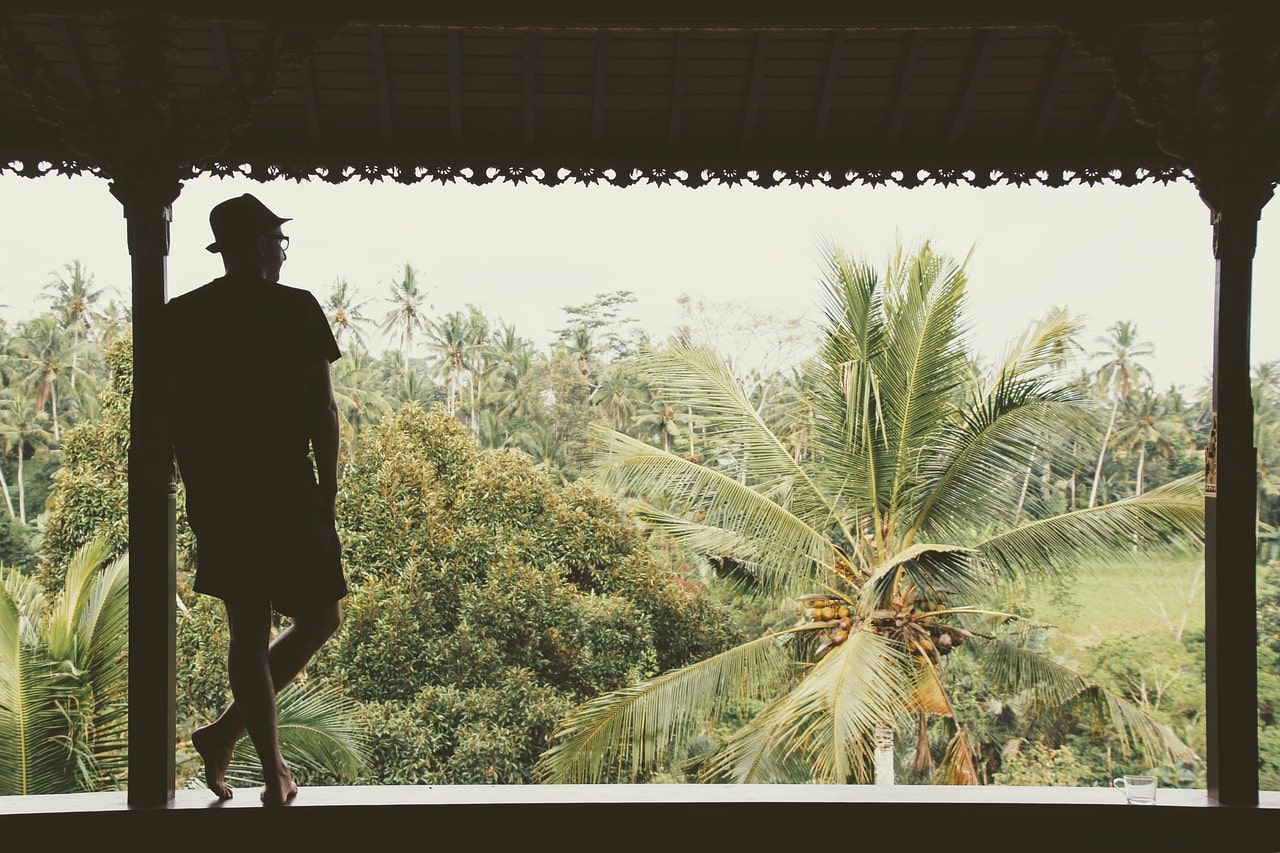
I’m a huge advocate of travelling solo, and Bali is a very solo-friendly destination. It is very safe to travel alone here, and you’ll find there are loads of other solo travellers to make friends with.
Being by yourself, however, comes with more risks attached.
Don’t worry though, because to help you out, I’ve put together this mini-guide for solo travellers in Bali.
- Don’t stagger home on that bike after your night out. GoJek or BlueBird.
- Find yourself safe accommodation. Something that has great reviews from other solo travellers in Bali.
- Ignore overly aggressive or pushy street vendors and cab drivers; saying nothing is the best policy. Being by yourself, you could be targeted more than groups.
- Book yourself on a tour with a group of other people. It’s a great way to get out there, experience new things and – of course – meet new people.
- Research tour companies to ensure they are reputable and come highly reviewed from other solo travellers (always a good indicator).
- Get a prepaid sim when you land at the airport, so you’re always connected here.
- Don’t go off-grid! It’s a good idea to let people know what you’re doing, your travel plans, and if you’re ok. A simple message back home, calling your friends, or just telling your accommodation staff what you’re up to that day are good policies.
- Travel light because, honestly, it really is no fun lugging heavy bags around.
- Be kind to yourself! Just because you’re supposed to be having the time of your life, doesn’t mean you have to be doing things you’re not happy doing. Don’t forget to recharge!
- Take your time – it isn’t worth burning out while trying to tick everything off your list. You don’t have to do everything the guide book says!
Bali is totally a top destination for solo travellers!
Don’t be put off at all. Just find yourself some good accommodation, chat to people and have the most amazing (and Instagrammable) time of your life.
Is Bali safe for solo female travellers?
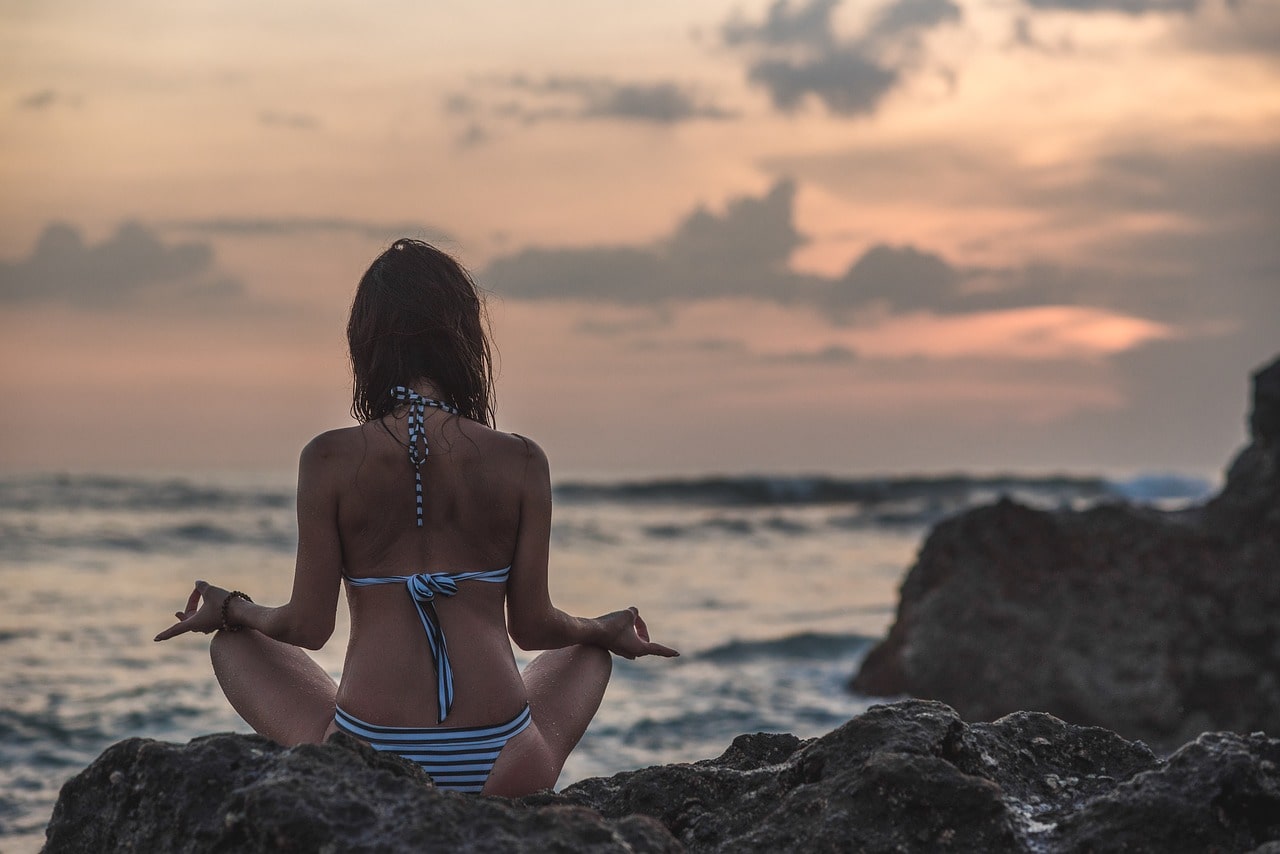
Like many destinations in Southeast Asia, Bali is actually pretty safe for solo female travellers. As a result, it’s super popular for women!
However, being a woman alone anywhere in the world can come with more risks than your male counterparts will have. Sorry ’bout that. For this next bit, I’ll defer to my solo-travelling, country-bagging, noodle-eating friend Clair for advice.
With that in mind, we have made a list of tailor-made safety tips for solo female travellers in Bali to help keep you travelling safely.
- Seriously, always trust your gut. If you’re uncomfortable anywhere, get out. This advice alone can save you from most awkward and dangerous situations.
- Find female-friendly accommodation! Hostels usually have a female-only dorm. If you’re classier than that, go for a chilled boutique hotel or even a private Airbnb. Just make sure it’s well-reviewed by other solo female travellers.
- There are groups online for travelling, like-minded ladies; Facebook groups like Girls Love Travel and Host A Sister already have lots of information (you can use the search bar for specific topics already discussed in the groups) and they’re platforms for meeting up with other women for a hike, a night out, a pole-dancing class, whatever!
- Bali (especially Ubud and Canggu) have loads of studios that offer group classes – for fitness, art, dance, cooking classes, diving, whatever. This ticks all the boxes – you’re doing something new, exploring more of Bali and meeting people along the way.
- Watch your drink. Drink spiking is a problem. Do not leave your drink alone – down it before you go to the bathroom or to the dance floor!
- It’s best not to walk around at night by yourself, no matter how close your accommodation may be. Take a cab, or buddy up with some other travellers.
- Think about what you wear. Even though Bali is a popular tourist destination, much of the island is still very rural (and conservative) and in all temples, you’ll be asked to cover up; loose-fitting clothing will work well, especially in the heat. And besides, I’ve seen lots of guys and girls turned away from stores further inland because of their clothes.
- Ignore unwanted attention. Catcalls can happen, especially in Kuta, and especially at night. Local men are usually not forward. Usually.
I’ll make a special note that the only locals who have made me feel unsafe were GoJek drivers. After at least a hundred GoJek rides, I’ve had two bad experiences – one where the GoJek driver passed my Airbnb by a quarter kilometer and didn’t want to double back because of the traffic (they aren’t allowed to decide this) and another where the driver asked personal questions the entire ride and tried kiss me at the end. Like I said, go with your gut! If a driver makes you feel unsafe, make them stop so you can get off and call another ride!
That’s my two-cents. Don’t be afraid to conquer this island on your own! Find a comfortable place to stay, get connected with other travelers through your accommodation or online groups and remove yourself from any situation that makes you uncomfortable.
Is Bali safe to travel for families?
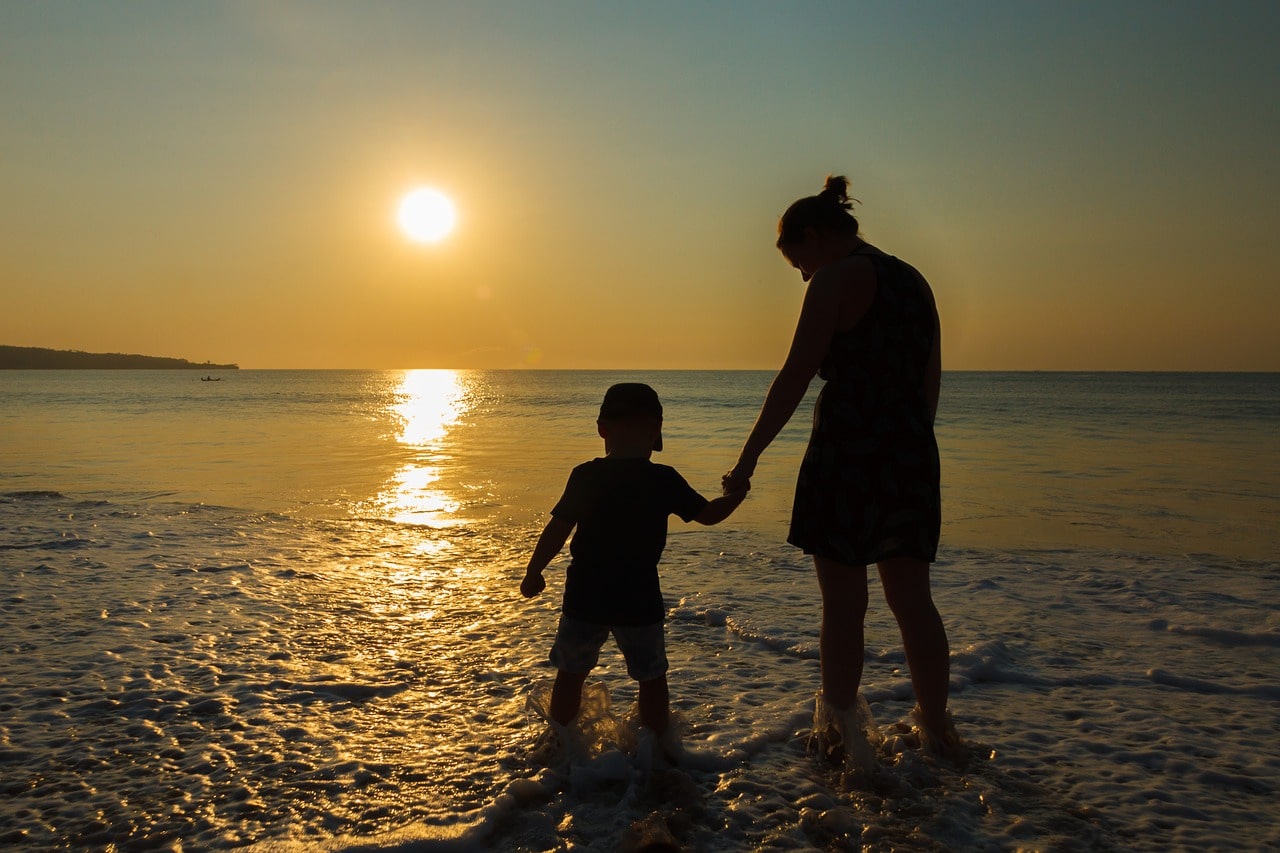
Solo travellers love Bali, couples love Bali, and yes: families love Bali too.
In fact, Bali loves families! Your kids will probably be doted-on at every restaurant you visit. There are still a few things for you to bear in mind, however, so here are some travel tips for families in Bali.
- Choose your hotel wisely! There are a wide range of options, from beachfront resorts with pools and hotels, to private villas with their own pools and catering staff. Check to ensure you’re not booking a crazy hostel or an adults-only hotel (rare, but just check to be sure).
- Guesthouses and homestays could be a good option, depending on the age of your children. This means you get to be part of the family and have a real cultural experience.
- Protect yourself from the sun and stay hydrated, as Bali gets really hot and the sun is absurdly powerful. Wear sunscreen, cover up and stay out the sun at its peak.
- Be mosquito-smart! These blighters can carry dengue fever. Cover up, use repellent (no DEET for children), and stay away from still/stagnant water, especially at dusk and dawn.
- Leave the baby strollers and carriages at home – you won’t be able to use them. Most sidewalks are inaccessible for these, so it’s best to bring a sling/baby carrier if you have small children.
- If you want to hire a car, bring a car seat. These are not readily available or easy to arrange.
- Keep away from animals (i.e. street dogs and monkeys) and don’t encourage your children to go near them. They’re unpredictable and can be especially dangerous for children.
- Be well aware of how safe a beach is – or isn’t. Even if you’re at a “safe” beach, don’t let your kids into the water alone. This might sound excessive before you’ve seen the beaches but once you do, you’ll know to keep close to the kids.
- Don’t be afraid to eat out with your kids! Local restaurants or warungs may be able to offer non-spicy versions of Balinese food; you will usually be able to find Western cafes and restaurants, especially in more touristed areas.
- Pack medicine for bad tummies just in case – as well as plenty of other medical supplies. Though if you need anything, you can walk into a pharmacy, Google Translate in-hand, and get almost anything.
- Be aware: safety standards won’t be as high as back home… Guard rails, pavement quality, road etiquette, restaurant sanitation: not always top-notch.
You + Kids + Bali = an unforgettable experience (for all the best reasons)
Though a more adventurous time in Bali is probably more suited to older children and teens, it is possible to stay with younger children – especially at the resorts in Nusa Dua.
You should research your time in Bali and maybe leave some of the heavy-lifting to reputable tour providers. Bali is safe for families, definitely, and you will all love this island.
Is it safe to drive in Bali?
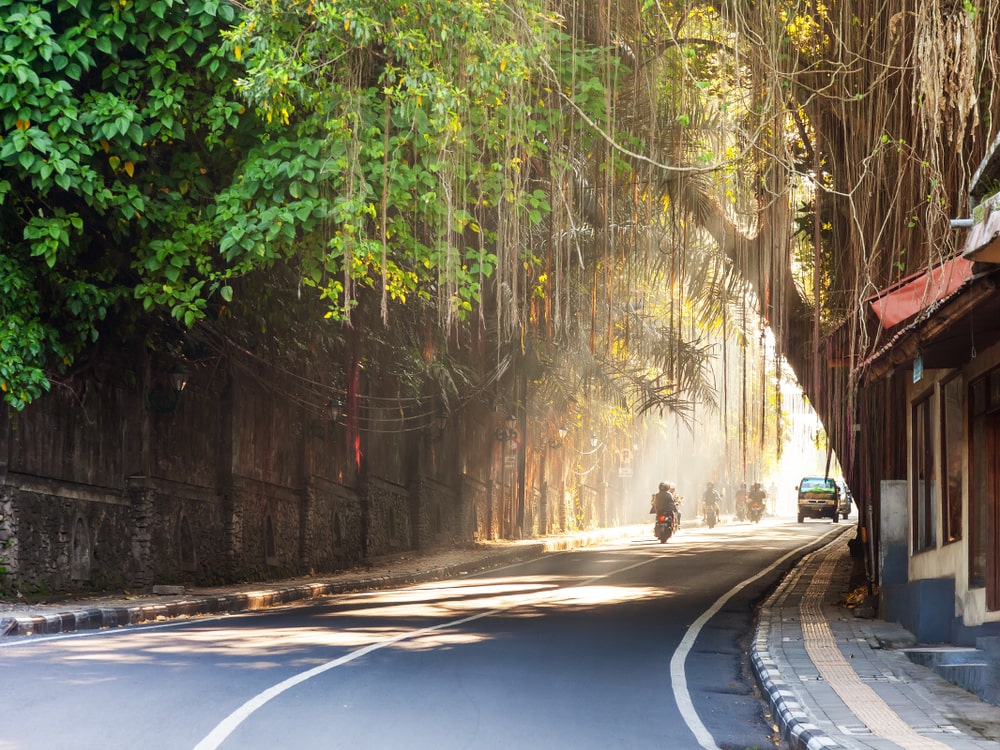
Driving in Bali is something you can do, but it’s not always something we recommend.
I drive a scooter. I learned to drive in Bali back in May of 2019 and have been without incident since (knock on wood). I do not believe driving in Bali is for everyone, but it can definitely be done.
If you really are dead-set on driving on this Indonesian island, I’ve got these quick tips for you.
- Cars aren’t the way forward. With heavy traffic and mainly two-lane roads, driving a car isn’t always the best option. If you need a car for your group, I recommend renting one with a driver rather than adjust to completely different set of haywire rules that apply to cars. I’ve got no experience here, so I can’t advise what to do behind the wheel.
- Most people rent motorbikes, because it’s much easier. You can navigate traffic more simply and tackle the smaller side roads, too.
- You need an international drivers permit! Your scooter rental place might not need one, but the police (and your travel insurance!) definitely will.
- Be careful when renting a motorbike: it is not a good idea to learn how to ride a motorbike on Bali’s busy streets. If you can learn before you’re on the island – tally ho! Otherwise, ask at the bike rental place to be shown the ropes. They’ll know a backroad where you can practice.
- Always wear a helmet! Not only is it mandatory, but it should be common sense.
- Try not to drive/ride after dark, because a lot of vehicles and many roads don’t have proper lights; there’s lots of hazards, including people, chickens, dogs, sharp corners…you get the idea.
- Be aware of other drivers. There are many inexperienced tourist drivers here, and things can go wrong quickly.
- Listen to the horns! Most often, Bali drivers aren’t honking to tell you off, just to let you know that they’re there.
- Use your horn, too! Don’t be scared, it’s there for a reason and it’s essential to make your presence known on the road. I use it around blind corners or if someone’s looking the other way before pulling out. At least twice it’s definitely saved me.
- Traffic police might stop you for the smallest of offenses (or no offense), and will often demand cash from you. If you’re driving with a helmet and the proper IDP, they might not take anything from you, but then again they might. Though I don’t recommend it personally, a friend of mine has succeeded twice in passing right by the cops as they wave them down. And on that note, the guys stopping traffic in front of supermarkets and restaurants aren’t cops, just traffic help – stop for them.
- Always check the state of the vehicle before you rent it – car or motorbike. Take pictures and/or a video, just so previous damage doesn’t get blamed on you when you take it back.
- Make sure your travel insurance covers you for renting a vehicle. This is the time to read the fine print.
While writing this, I realized I’ll have to write a full guide to renting and riding in Bali. Expect that soon!
When you are in Bali, you will probably see a lot of other travellers zipping around on motorbikes – sometimes in pairs, sometimes with surfboards attached. While it is a good way to get around, it is also a good way to get yourself hurt.
Make sure you really do know what you’re doing. If you don’t, you can still get out on a scooter – just download GoJek or Grab and call one the same way you would an Uber or Lyft. Prices are super affordable, and the drivers will always have a helmet for you.
Are GoJek and Grab safe in Bali?
As in much of Southeast Asia, there is no Uber in Bali. There are two ride-calling apps here: GoJek and Grab. Both will give you the option to call a car or a scooter, and will give you a fixed price, so no haggling like you may have to do with a taxi. Unless have an Indonesian bank account, you won’t be able to pay in-app, just with cash directly to your driver.
These apps are lifesavers on the island, because not only can you call cars, but you can call anything – food delivery (every day, man), shopping (a couple nights when we needed mixers for our gin), massages (I’ve indulged twice), even doctors in some areas.
GoJek and Grab won’t work in some areas. In busy tourist areas like Echo Beach, Batu Bolong, Batu Belig and Kuta Beach, the so-called “taxi mafia” will threaten and physically harm rideshare drivers. Understandably, they are reluctant to enter these parts.
The app won’t tell you where the drivers do and do not go so you have to just be aware. This isn’t hard since whoever runs your accommodation or serves you at a restaurant will know whether you’re in a no-go zone. Just ask before you call on the app.
Are taxis safe in Bali?
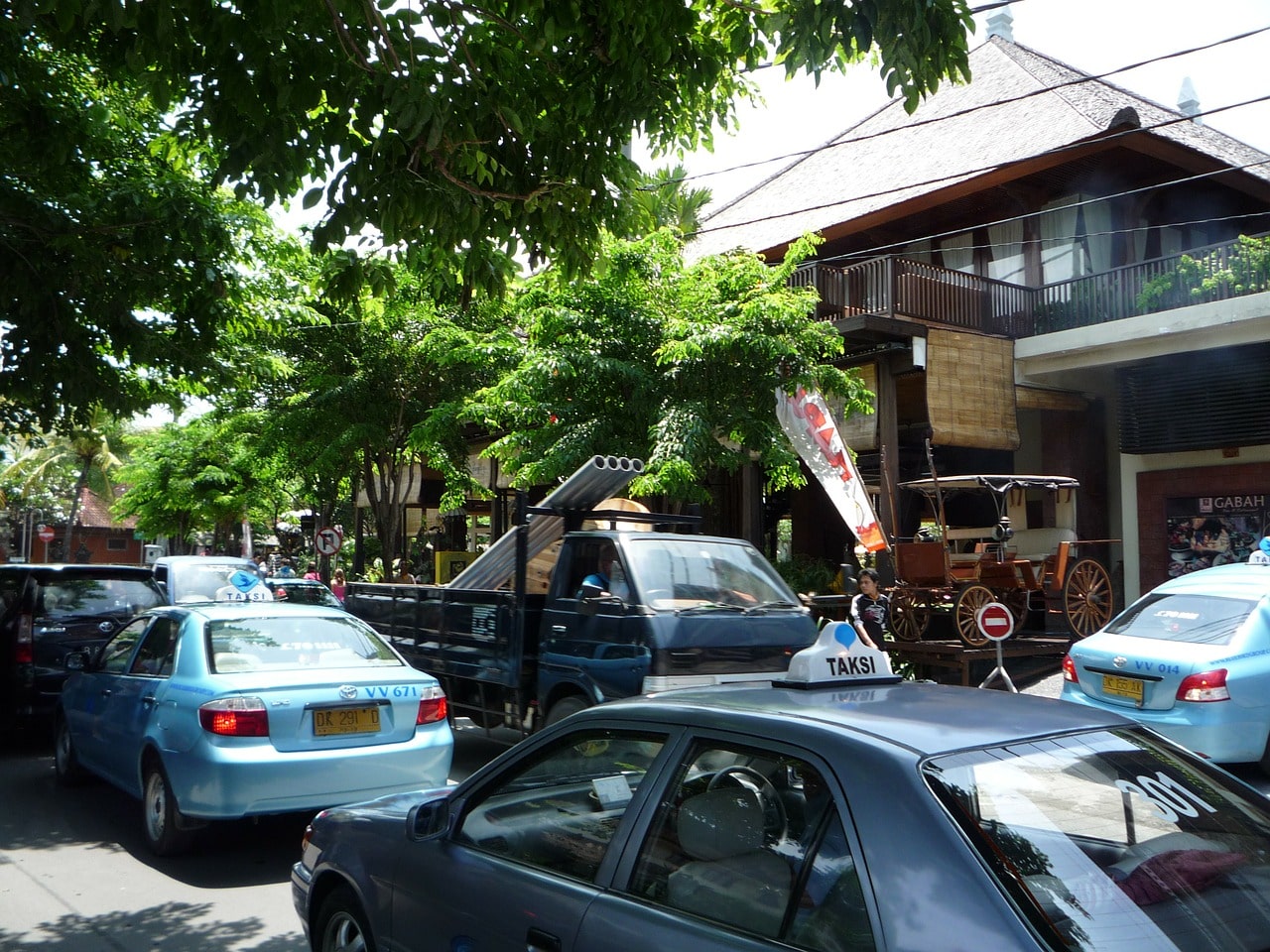
Like many places in the world, taxis are the lifeblood of Bali’s transportation system and pretty much essential for getting around.
However – also like many places in the world – taxis in Bali have their own set of rules and risks that you should definitely know about…
- Taxis in Bali are not always metered. If this is the case for you, agree on a price before you get in.
- Get to know a reputable company, like Blue Bird Taxi. The drivers speak a decent amount of English, will always use the meter, and the company has an Uber-like app you can use.
- Be wary of fake Blue Bird Taxis! They are indistinguishable. Using the app will solve this problem, however.
- Make sure the car that you’re getting into is definitely for you… There are so many taxis in Bali! It’s an easy mistake to make. Check the car make, license plate and driver’s name against what you’ve got on the app.
- Carry small change and notes as drivers will not always be able to change large bills. You may lose out if you pay with a large denomination of rupiah and the driver “has no change” (they might, however, so it’s best just to have small bills regardless).
The most hassle you will get from cabs in Bali is at the airport, from people trying to get you into their most probably unlicensed cabs. Arrange to be picked up from your accommodation, use an official taxi rank or book ahead.
However, taxis in Bali are just about as safe as anywhere else in the world.
Is public transportation in Bali safe?
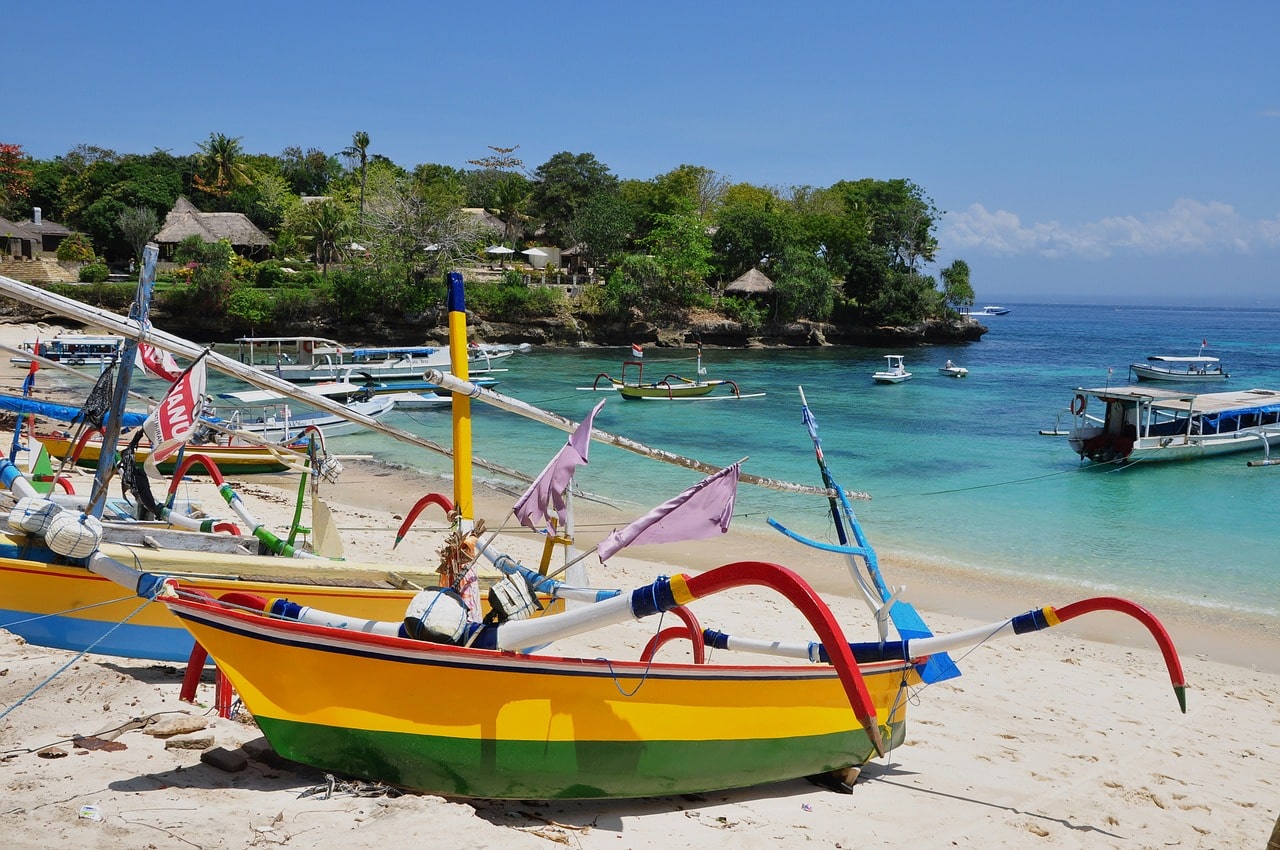
Hahahaha! Public transport in Bali?
With rental cars and motorbikes, as well as taxis, seeming to rule Bali’s roads, you may be wondering if there is any public transportation for you to use in Bali.
The answer is yes: there is. I’ll run you through the options and how you can stay safe on Bali’s public transport.
- Public buses: Comprising a fleet of large minibuses and full size buses, these can be crowded, have long delays and aren’t often the most comfortable of options. We would almost say that these aren’t worth your time and money at all. You don’t see these in the fun places anyway.
- Tourist buses: These are a pretty convenient way to get around and see the top sights in major tourist areas on Bali. These are usually small minibuses that are much more comfortable than public; they have aircon, and some even have wifi. Two reliable companies that you can use are Kura-Kura Bus and Perama. They boast reasonable fares and it’s a good way to meet other people, but their service isn’t always direct. You’ll probably only hop on these if it’s included in a tour purchase.
- Boats: Being an island, there are many boats that connect to nearby island destinations (the Gili Islands included). However, you should be wary of using boats. Conditions are often rough and it’s probable the crews have had no training; add to this an occasional lack of life vests and other equipment, and Bali’s boats could seem quite unsafe. I skip out on speedboats and smaller boats (i.e. anything under 30 seats) – apart from between smaller islands. I travel on larger, more modern and seaworthy vessels whenever I can.
- Ojek: Ojek are motorcycle/motorbike taxis. A good way to order a motorbike taxi is by using the app GoJek (do you see the play on words?). As we mentioned earlier, GoJek works like Uber, but you can order a motorcycle for yourself on demand if you see locals hanging around their bikes on Batu Bolong as the clubs start to die down. They can be quite risky, so we would recommend only ever using the app to be on the safe side.
- Bemo: The old fashioned bemo used to be a big part of Bali’s transport section, but not so much anymore. These are essentially old minibusses and vans that drive along specific routes. They are very time consuming and often uncomfortable. If you want the experience, most will have a bemo terminal where you can pick one up. Figuring out the route system, however, can be really tricky. I’ve got little to no advice there.
With no “official” transport networks like trains or a metro system, you can see why Bali’s roads are clogged with private cars, motorbikes and taxis.
What’s available in terms of public transport in Bali is mostly safe – with the exception of boats. Research the boat company before booking or boarding.
Is the food in Bali safe?
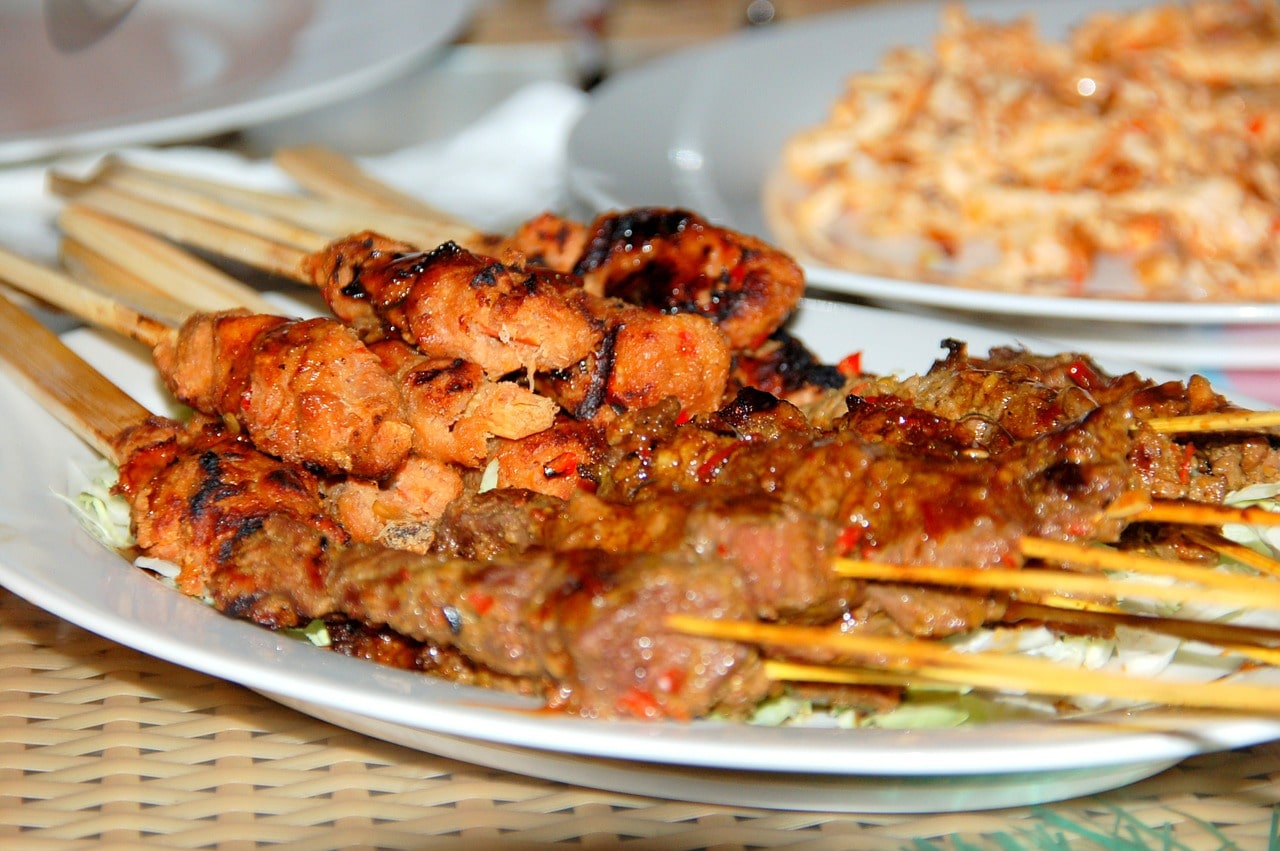
Local warungs, yum! Trendy cafes, fancy! There’s a lot of tasty food on offer in Bali.
However, it’s not all up to scratch in terms of food hygiene. There’s even a name for what you may get from one of these establishments: Bali belly.
Warungs are delicious local restaurants where the food is mostly pre-prepared and you can select which sloshy-looking dishes you want to throw on top of a scoop of rice (nasi campur). The food here might have been sitting out for hours. Besides the food getting cold and unappetizing, this increases the chance of food poisoning. Scary, right?
So whether you want bebek betutu (smoked duck) or delicious pork satay, here are my pointers to keeping Bali belly at bay…
- Don’t avoid the warungs all together, but try and go early (like, 11am) so the food is still relatively fresh.
- Go to busy restaurants; a high turnover means ingredients cooked fresh and hot. It also means it’s popular, which is a good thing.
- Do your research because there are a ton of places to dig into across the island. You won’t want to miss out on anything particularly amazing.
- If something looks like it’s been laying around in the sun all day, don’t eat it! Instead go for things that are freshly cooked.
- Don’t be afraid of street food, either (though it might just be corn). Look for clean places where people are lining up or crowding outside to get their fill. More popular places are almost always worth it.
- Go easy on it… Diving into Bali’s cuisine, or any different cuisine, straight away will send your stomach into shock. Ease into it!
- Wash your hands! This is a very simple, but huge (and hugely overlooked) part of not getting ill on your travels. Bring hand sanitiser in case there are no handwashing facilities.
It’s pretty straightforward, but a good rule of thumb when it comes to safely eating your way around Bali is to go where other people go. Locals know what they’re doing, so follow the crowds!
Other than that, err on the side of caution when it comes to places that look under-hygienic and you should avoid getting sick.
Can you drink the water in Bali?
The water in Bali is not safe to drink.
This means that it cannot be drunk straight from the tap.
Instead of adding to the problem of plastic waste, you should bring along a refillable water bottle and some purification tablets.
In addition, you can consume water that has been boiled – so it is safe for a cup of tea or coffee.
Most restaurants that serve ice in drinks will be using filtered water for their cubes. Be suspicious if you’re offered ice anywhere that’s super cheap though.
Is Bali safe to live?

Unequivocably yes, Bali is safe to live!
A lot of expats choose to settle here, at least for a while, with a fairly large community of digital nomads and long-term travellers finding it hard to tear themselves away from the beaches and beauty of Bali. I like to say Bali takes the nomad out of digital nomad…. Get it? It’s because we stay here so long….
But living in Bali will be a different way of life to what you’re used to at home. You know most of this from all the above info.
Thoroughly research where you plan to live in Bali. Speak to other expats and see how they do it. Most importantly, you should definitely pay an extended trip to Bali before deciding whether or not you want to live here.
My advice, if you’re going to live in Bali, is to spend some time around the different communities here – Canggu, Ubud, Seminyak, Uluwatu, Kuta (meh). Choose a spot you want to live and rent a place just outside that area. If you plop yourself down in the middle of everything, you’ll start to curse the noise, the business, and the tourists. Living a kilometer away doesn’t mean you’ll miss out! It means you’ll pay way less and have the option of escaping the hectic center.
If you’re living in Bali, you’re more likely going to rent a scooter. Prepare yourself for battle!
The rainy season also affects the island, with downpours flooding roads and making transport a nightmare – especially if you are travelling around on a motorbike. Roads can get slippy or disappear completely, and even walking around during this time can be extra dangerous, what with the non-existent pavements and heavy traffic.
Living Bali is, however, much safer than other parts of Indonesia. There is some level of crime, but this is relatively small compared with the rest of the country, and is usually focused on heavily touristed areas.
How is healthcare in Bali?
Bali may be something of a paradise, but its healthcare leaves something to be desired; it probably isn’t as good as in your home country.
In the South Bali area and in Ubud there are health clinics aimed at tourists. However, these can be expensive.
Other private clinics dotted around the island – also aimed at tourists – can be pricey. For example, BIMC is a private clinic which can treat serious conditions, but the bills are equally serious.
This means that you really must have adequate medical travel insurance when you travel to Bali. The price of healthcare in Bali just is not something you want hanging over your head.
All that said, minor injuries and illnesses can be treated on the island fairly easily, but for anything serious… the likelihood is that you will have to be evacuated off the island.
Pharmacies in Bali are good places to go if you need some advice or medication. There’s a lot more available over-the-counter than there is back home in the U.S. Kimia Farma is a good chain with lots of locations, capable staff and prices that aren’t too high.
Be careful in irreputable pharmacies, which can sometimes carry fake or out-of-date drugs and medicines. You’ll be able to tell which these are by the look.
All good quality hotels and accommodation will be able to recommend a doctor who speaks English.
Helpful Bali Travel Phrases
The national language is Bahasa Indonesia, or simply Indonesian. This is what you’ll hear on TV and read in the newspapers, and it’s the language of government, education, business, and just about everything else in Indonesia.
That being said, all the major Indonesian islands have their own languages. In Bali they speak Balinese alongside Indonesian. Here are some useful Indonesian phrases to get you going:
Hello – Halo
Good morning/afternoon – Selamat pagi/sore
How are you? – Apa kabar?
I’m fine – Baik
Thank you – Terima kasih
You’re welcome – Sama-sama
Please – Silakan
Where is the bathroom? – Kamar kecil di mana?
What is this? – Ini apa?
Sorry – Maaf
I want a beer/Bintang – Saya mau bir/Bintang
See you later – Sampai jumpa
If you’re looking for more, Duolingo has an excellent Indonesian curriculum and, as always, there are tons of resources available across the internet.
Final thoughts on the safety of Bali

Bali might have hit the headlines with volcanic eruptions and other serious events over the years, but it’s never been knocked off travelers’ bucket lists. People spend a long time here – and love it; equally, people spend just a few nights here – and love it.
Bali is definitely safe, but as with all destinations, you should use your common sense to ensure you don’t get yourself into any dangerous situations.
Before you head to Bali, buy your travel insurance. And you can save this article on your browser to reread during your flight into Denpasar. See you here!
Yay for transparency! Some of the links in this post are affiliate links. This means that if you book your accommodation through the site, we will earn a small commission at no extra cost to you. Your support helps keep the site going.
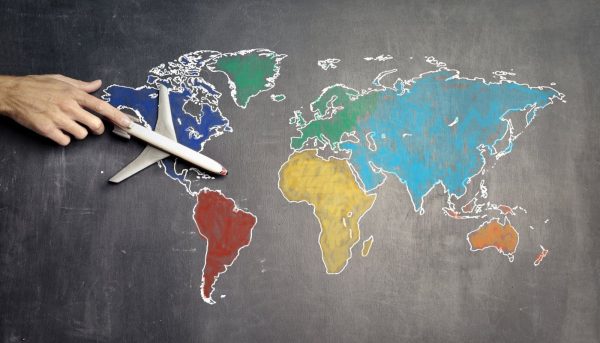

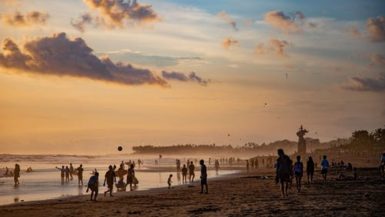

Leave a reply